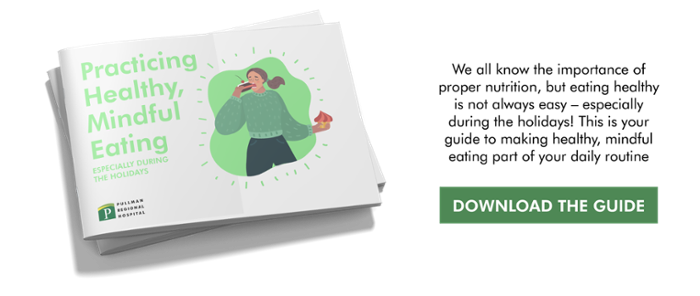While proper nutrition is a daily concern, March has been designated “National Nutrition Month” to bring awareness to the habits individuals should be implementing year-round. It’s a time for healthcare providers like Joyce Marshall, a Registered Dietitian and Director of Nutrition Therapy, to disseminate valuable information to patients and the community as a whole.
“National Nutrition Month is a nationwide campaign meant to promote healthy eating and celebrate registered dietitians,” shares Marshall.
Healthy Eating with MyPlate
Throughout March, the dietitians at Pullman Regional Hospital will be showcasing MyPlate, the USDA’s visual nutrition tool that promotes balanced meals. The MyPlate recommendations focus on a balanced proportion of foods that supplies the nutrients people need the most. For example, half the plate is comprised of fruits and vegetables. Only one in ten American adults eat the recommended amount of vegetables, and only one in seven eat the recommended amount of fruit, so the visual representation of MyPlate serves as a good reminder. Protein, calcium and whole grains also have a place on the plate.
Marshall wants community members to know it’s not all about eating your veggies. “One thing you might also notice is that desserts or other ‘fun’ foods you occasionally crave are missing from the plate. That might not be sustainable for most people,” she notes. “Historically, our National Nutrition Month celebration has included utilizing chocolate in creative, fun and healthful ways.”
Beware of Fad Diets
The MyPlate tool is fairly simple, and may, in fact, be too elementary when pitted against all the conflicting nutritional information that’s accessible on a daily basis—including “fad” diets.
“The world of science is complex. At times, research can give us useful information. At other times, bias within the scientific community or poorly designed studies might actually lead us down the wrong path,” explains Marshall. “I always try to look at scientific data through a more historical human lens and ask different kinds of questions like, ‘Have humans thrived on this food for thousands of years? Does this food meet human needs for enjoyment, well being and social connection?’ In my mind, these are important considerations when evaluating the latest and greatest food or diet.”
Marshall also advises individuals seriously consider both short-term and long-term results. If a diet is “new to the scene,” there may not be enough evidence proving it safe to follow for a lengthy period of time.
Sustainability is another consideration. “You have to ask yourself, ‘Is this how I want to be eating five years from now?’ You want to make food choices that are truly sustainable for you, that give you energy and help you live out your values,” suggests Marshall.
And, if individuals find they have a difficult time sticking to a diet or nutritional program, it might not be the right solution. “Time and time again, we see people who commit to a set of changes that are easy to accomplish in the short term, but in the long term, it’s just not doable,” cautions Marshall. “Instead, we always try to work with what’s sustainable, enjoyable, and a more moderate approach; a happy medium.”


